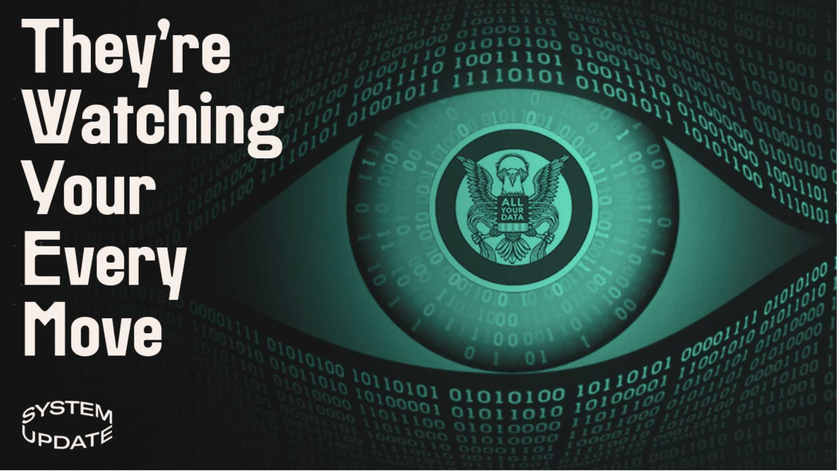A once-secret, now-revealed report prepared for Biden's Director of National Intelligence, Avril Haines, details a remarkably invasive spying program aimed at American citizens. The report was prepared for Haines by a team of senior advisors in January, 2022, and was marked "secret" – making it a crime for anyone to discuss it – because its contents were never intended for public viewing. But Sen. Ron Wyden (D-OR), to his credit, badgered Haines for months until she finally released the report, and its admissions are genuinely stunning.
The crux of the report describes how the CIA, NSA and other U.S. security state agencies are purchasing enormous amounts of highly intrusive data about the activities of American citizens. This data is so personal, and enables such a comprehensive view into the private lives of Americans, that it would be unquestionably prohibited for these intelligence agencies to collect it on their own without first obtaining a "probable cause" search warrant. Yet by purchasing the data en masse – using the taxpayer dollars of the very citizens on whom they are spying – the U.S. intelligence community insists that it is merely acquiring "publicly available information" and thus has no barriers, legal or constitutional, on the dossiers they can compile, store, analyze and utilize on American citizens.
Yet the acknowledgements in this once-secret report – straight out of the mouths of the DNI's senior advisors – make very clear how dangerous this so-called commercially available information ("CAI") actually is when placed into the hands of the U.S. Security State (emphasis added):
CAI clearly provides intelligence value, whether considered in isolation and/or in combination with other information, and whether reviewed by humans and/or by machines. The IC [intelligence community] currently acquires a significant amount of CAI for mission-related purposes, including in some cases social media data [redacted] and many other types of information….
Without proper controls, CAI can be misused to cause substantial harm, embarrassment, and inconvenience to U.S. persons. The widespread availability of CAI regarding the activities of large numbers of individuals is a relatively new, rapidly growing, and increasingly significant part of the information environment in which the IC must function….
The DIA [Defense Intelligence Agency] currently provides funding to another agency that purchases commercially available geolocation metadata aggregated from smartphones. The data DIA receives is global in scope and is not identified as “U.S. location data” or “foreign location data” by the vendor at the time it is provisioned to DIA….
CAI can reveal sensitive and intimate information about the personal attributes, private behavior, social connections, and speech of U.S. persons and non-U.S. persons. It can be misused to pry into private lives, ruin reputations, and cause emotional distress and threaten the safety of individuals. Even subject to appropriate controls, CAI can increase the power of the government’s ability to peer into private lives to levels that may exceed our constitutional traditions or other social expectations. Mission creep can subject CAI collected for one purpose to other purposes that might raise risks beyond those originally calculated.
Putting legalities and constitutional limits aside for the moment, what possible legitimate motive does the U.S. Government have for purchasing, collecting and storing sweeping dossiers about the private lives of American citizens? Why should the CIA and NSA be handed American tax dollars which it then uses to purchase information about where American citizens go, what they do, with whom they do it, with whom they speak – all without the slightest suspicion that those citizens have done anything wrong, let alone possessing "probable cause" to believe they are engaged in criminal activity or other wrongdoing?
The demand for basic privacy rights by the Founders is evident in multiple amendments in the Bill of Rights. By itself, the Fourth Amendment's guarantee of "the right of the people to be secure in their persons, houses, papers, and effects, against unreasonable searches and seizures," and the additional protection that "no Warrants shall issue, but upon probable cause, supported by Oath or affirmation, and particularly describing the place to be searched, and the persons or things to be seized," demonstrates how contrary this program is to core constitutional values.
Over and over, this once-secret report emphasizes how dangerous this information is in the hands of the U.S. Government, and how many different ways this data could be used to destroy citizens' lives:
CAI can contain information that is deemed sensitive, meaning information that is not widely known about an individual that could be used to cause harm to the person’s reputation, emotional well-being, or physical safety….
Studies document the extent to which large collections of sensitive and intimate information about individuals, CAI or not, can be subject to abuse. Documented examples of LOVEINT abuses (government officials spying on actual or potential romantic partners) involving other intelligence collections demonstrate the potential for comparable abuse of CAI held by the IC.
In the wrong hands, sensitive insights gained through CAI could facilitate blackmail, stalking, harassment, and public shaming.
“This report reveals what we feared most,” said Sean Vitka, a policy attorney at the nonprofit Demand Progress, to WIRED about this new report. “Intelligence agencies are flouting the law and buying information about Americans that Congress and the Supreme Court have made clear the government should not have.”
On our SYSTEM UPDATE program on Tuesday night, we examined and dissected each of the key parts about this report (you can watch that episode at the link below). What is particularly striking is that just last week, we commemorated on that program the 10-year anniversary of the start of the Snowden reporting (the first article ever published from the archive was my June 6, 2013 report in The Guardian revealing that the NSA was collecting enormous databases about the communications activities of American citizens, something that Obama's senior national security official, James Clapper, had just months earlier falsely denied to the Senate was being done).
To do so, I spoke with both Edward Snowden and Laura Poitras, the Oscar-winning director of CitizenFour, about what has changed since the world learned that the NSA had secretly converted the internet into a weapon of mass suspicionless surveillance, only to now discover that the NSA, CIA and other agencies are circumventing whatever minimal legal and constitutional limits they have by purchasing this data for their own use.
On Tuesday night, I devoted the full hour to this newly revealed domestic spying program, taking viewers step by step through this report. You can, and I hope will, watch it at the link below. That program places this new domestic snooping into its historical context, whereby fear-mongering has been used by these security agencies since the internet first emerged under the Clinton administration, all with the goal of ensuring that no American has any privacy in the digital era. And, most importantly, we examined the legal and constitutional limits that are being ignored and violated by this program whereby the U.S. Government brazenly uses Americans' own money to spy on them in ways that would otherwise, as they admit, be legally barred.
On Monday night, we aired a one-hour interview with Democratic presidential candidate Robert F. Kennedy, Jr. (you can watch it at the link below). It was one of the most interesting interviews I have conducted with a major political figure - and RFK is clearly that: he is polling consistently at 20% against Joe Biden, while Marianne Williamson receives another 8-10%. We discussed a broad range of issues: COVID, the war in Ukraine, China, and the ways in which propaganda functions and how he has been manipulated by it. On our live after-show that we broadcast exclusively for subscribers (meaning subscribers to our Substack page who have transferred their subscription for free to Locals, which you can do here), I shared some thoughts about that interview and RFK's candidacy.
The Tuesday night episode of SYSTEM UPDATE that we devoted to this report is here: here.
Our Monday night interview of Robert F. Kennedy, Jr. can be watched here: here.
And our commemoration of the ten-year anniversary of the start of the Snowden reporting, with Edward Snowden and Laura Poitras, can be seen here: here.



















